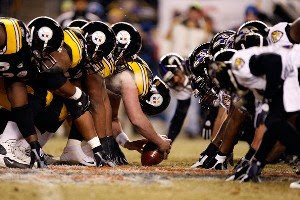
Delaware has legalized sports betting. Governor Jack Martell signed legislation permitting it and The First State’s Supreme Court has determined that betting on individual games, as well as parlays, will be legal. Operations are scheduled to be in place by the start of the football season. With table games on the way this winter, Governor Martell estimates that $50 million in fresh revenues will hit the state’s coffers in 2010.
The wagering will take place through Delaware’s race tracks, which have become “racinos” in recent years with the addition of slot machines. The betting will take place on the premesis (no apparent provision for phone/online) and the racetrack will act as the bookmaker.
Obviously, the Delaware racinos welcome this opportunity to attract new bettors. In a press release, Delaware Park COO Bill Fasy said “We believe that the single game sports lottery, with a proper betting line, will provide an exciting entertainment option for our guests…”
(Presumably, the use of “a proper betting line” was a great relief to sports bettors who feared that an improper betting line would somehow find it’s way into use at Delaware Park.)
Is Delaware Ready? Do the racinos and politicians of Delaware know what they’re doing? They better. But both the regulators and those who will be taking the action are a long way from having things ready to go, and even knowing how things will work. Nobody in Delaware is prepared to answer questions on what kind of bet offerings will be available and what the limits will be. It is also unclear whether the state will collect tax money based on volume of wagering or profitability.
And chances are the folks in Delaware are overestimating the profitability of their sports betting operation. One unpleasant aspect for the house is the opportunity to lose. Bookmaking is a skill, and risk management is imperative to a proper sports betting operation. And bettors in target markets may already have more convenient options.
Let’s take a look at some things that could lead to Delaware sports betting being a disappointment.
Unattractive Propositions: Does a “single game sports lottery” include not only sides but totals, money lines, teasers, buying points, etc.? While there will be more money bet on sides than anything else, people are used to betting on the other offerings. Delaware better have a well-rounded product offering, because they have more competition, and potential competition, than they realize.
Potential Legal Competition: New Jersey governor John Corzine is suing the federal government to repeal a law that makes sports betting illegal for all but four grandfathered states (Nevada, Delaware, Oregon, and Montana) that have had sports betting in the past. Of those states only Nevada has had full scale betting. The others simply had parlay card offerings.
Opinions are mixed as to how serious New Jersey is about this, but they certainly want to protect Atlantic City wagering interests. And Pennsylvania is keeping an eye on things as well. Rather than a long-term exclusive, Delaware could have merely a head start on sports betting.
Quasi-Legal Competition: Bill Frist’s celebrated “slide it into national security bill” legislation that supposedly made offshore wagering illegal (it actually addressed banking, not the actual gambling) has had little effect on those who actually want to bet. Plenty of people are still betting at offshore sports books and poker rooms as some foreign entities and even banks have picked up the slack for American banks who can no longer transfer funds into the online operations.
Illegal Competition With A Technological Edge: Legislation targeting funding of offshore wagering has been a boon for illegal bookies, with many who left the business now back in the game. A majority of those bookies now offer online wagering for their customers via service bureaus located outside the US. Bets are made online or via phone, then the weekly settling up occurs, as it traditionally has, at the local tavern. Delaware’s sports betting relies substantially on Philadelphia and South Jersey players. Will players enjoying the convenience of playing online on credit feel compelled to make the trip to the actual sports books to put their cash on the counter?
Poor Management Leading to Losses: Both government and racino types are used to their betting having a guaranteed 17%-25% (depending on the wager) skimmed right off the top of each mutuel pool in horse racing, as well as a guaranteed cut for the house programmed into each slot machine. There is no such mathematical certainty built into sports betting.
While making bettors lay $11 for every $10 they are trying to win gives the house a good head start, winning as a bookmaker is no sure thing. Online and Nevada bookmakers have found that out the hard way. Consistent winners betting big money have shut down the occassional poorly managed offshore sports book and have led to tremendous consolidation among Nevada sports books. Knowing that sports books require active and intelligent management to win, casino companies take all their properties in Nevada and turn them into affiliates of a central book, cutting the overall costs of operation and putting their (theoretically) best talent in charge of the overall bookmaking. But even those steps have not led to a surge of profitability for Nevada bookmakers.
Smart bettors can overcome the 52.38% poinstpread winners needed to win money from the bookmaker. And there are smart bettors who make money on a regular basis by doing so. That’s part of the dance required to set the proper wagering limits. It’s tough to manage the risk of the smart bettors while welcoming the unsophisticated action of the weekend plunger.
The fact that Delaware sports books could have periods of time where they don’t only not win, but lose, is a part of sports betting history in the state. As Mike Wilkening of Pro Football Weekly dug up, the original parlay offerings in the state of Delaware were shut down suddenly in late 1976 after bettors took advantage of arbitrage opportunities created when the Delaware lines and those in Vegas differered significantly. It is likely that lines weren’t adjusted to account for what was late season injury/weather information. This is the kind of mistake that is unlikely to be made in the information age, but there are a lot of new ways for sharp bettors to beat up on sports book mistakes.
Will Puny Profits Lead to Patience or Panic? Bettors in Nevada actually beat the casinos with their basketball wagers in the month of April. This shows that while earnings are highly likely, there will be fallow periods for the sports books. Winning streaks against the spread by local favorites like the Eagles, Giants, and Penn State could lead to losses for periods of time. Are the racinos ready for that? And if the contribution to the state is tied to profitability, how will state officials react to less revenue than is projected?
Some Nevada casino operators consider sports betting a convenience to their guests, knowing that the sports book is likely to earn less per square foot than any other part of the gambling floor. On the other extreme is Bally’s in Las Vegas, whose palatial sports book sits empty, closed down for not earning enought money. Which view will prevail in Delaware, and will that view be the same for both the racinos and the state?
Success Is No Lock: The legalization of sports betting in Delaware is far from a slam dunk for the state. It will take solid bookmakers backed by patient management and understanding state government regulators to make it work. Count me among the sports bettors looking to put them to the test this fall.
This article was written of Kevin O'Neill of Strategic Sports Publishing and RealWorldSports.com. An expert handicapper and researcher, Kevin is the recipient of numerous handicapping honors, awards, and top 10 documented rankings.
Kevin’s third book, Real World Sports Betting: How Real People Make Real Money in the Global Sports Marketplace, is available at a discount from his office. Additional titles include Football Betting: Strategies for the Smart Player and Football Betting’s Cutting Edge: New Strategies for a New Era.
Look for more from Kevin later in August.



















